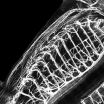Brain mechanism linked to relapse after cocaine withdrawal
2010-09-08
(Press-News.org) Addictive drugs are known to induce changes in the brain's reward circuits that may underlie drug craving and relapse after long periods of abstinence. Now, new research, published by Cell Press in the September 9 issue of the journal Neuron, uncovers a specific neural mechanism that may be linked to persistent drug-seeking behavior and could help to guide strategies for development of new therapies for cocaine addiction.
Previous research has shown that the ventral tegmental area (VTA) is a brain region that is activated when cocaine users experience a craving for cocaine after being exposed to cocaine-associated cues. The medial prefrontal cortex (mPFC), which receives input from the VTA via circuits that use the "reward" neurotransmitter dopamine, has also been implicated in drug craving after cocaine withdrawal. Further, increases in the level of brain-derived neurotrophic factor (BDNF) have been observed in the VTA and mPFC in rats after withdrawal from repeated cocaine exposure.
"BDNF plays a key role in modulating the structure and function of synapses, the sites of communication between neurons. Therefore, increased BDNF after cocaine withdrawal may drive synaptic changes that contribute to compulsive drug seeking behavior," explains senior author, Dr. Mu-ming Poo from the University of California, Berkeley. "It has been shown that increased BDNF in the VTA after cocaine withdrawal in rats promotes the drug-dependent motivational state. However, nothing is known about the potential BDNF effect on synaptic function and plasticity in mPFC neurons after cocaine withdrawal."
Dr. Poo and colleagues designed a study to examine how BDNF and the mPFC might contribute to relapse after cocaine addiction. The researchers found that the gradual increase in BDNF expression in the rat mPFC after terminating repeated cocaine exposure significantly enhanced the activity-induced potentiation of specific synapses. Dr. Poo's group went on to uncover the specific cellular mechanism linking increased BDNF with enhanced synaptic plasticity and demonstrated that interference with the key molecule in the BDNF signaling process reduced behavioral sensitivity after cocaine withdrawal in rats.
"In short, our results demonstrate that elevated BDNF expression after cocaine withdrawal sensitizes the excitatory synapses in the mPFC to undergo activity-induced persistent potentiation that may contribute to cue-induced drug cravings and drug-seeking behavior," concludes Dr. Poo. Although a clear correlation between rat and human behaviors of cocaine craving and relapse remains to be established, the cellular mechanism uncovered in this study does appear to have behavioral relevance and may represent a direct brain sensitization that is involved in triggering relapse.
###
The researchers include Hui Lu, Pei-lin Cheng, Byung Kook Lim, Nina Khoshnevisrad, and Mu-ming Poo, University of California, Berkeley,
Berkeley, CA.
END
ELSE PRESS RELEASES FROM THIS DATE:
2010-09-08
New York (September 8, 2010) – In a surprising and unexpected discovery, scientists at NYU Langone Medical Center have found that a single type of gene acts as a master organizer of motor neurons in the spinal cord. The finding, published in the September 9, 2010 issue of Neuron, could help scientists develop new treatments for diseases such as Lou Gehrig's disease or spinal cord injury.
The "master organizer" is a member of the Hox family of genes, best known for controlling the overall pattern of body development. By orchestrating a cascade of gene expression in ...
2010-09-08
A team of scientists, led by University of California, San Diego School of Medicine researchers, has synthesized hundreds of new compounds with the potential of reducing the production of the A-beta 42 peptide, a primary component of Alzheimer's disease (AD).
In mouse models, one tested compound specifically reduced levels of A-beta 42, which is believed to be responsible for the destruction of neurons, but left other essential enzymatic activities in the brain unaffected, said Steven Wagner, PhD, a project scientist in the UCSD Department of Neurosciences.
The ...
2010-09-08
A group of international astronomers in the UK, France and the USA, led by the University of Leicester, have found proof to confirm the distance and brightness of the most extreme ultra-luminous X-ray source, which may herald a new type of Black Hole.
The X-ray source, HLX-1, is the most extreme member of an extraordinary class of objects – the ultra-luminous X-ray sources – and is located in the galaxy ESO 243-49 at a distance of ~300 million light years from the Earth.
The astronomers' findings confirm that the extreme luminosity (which is a factor of ~100 above ...
2010-09-08
CAMBRIDGE, Mass. – A type of neuron that, when malfunctioning, has been tied to epilepsy, autism and schizophrenia is much more complex than previously thought, researchers at MIT's Picower Institute for Learning and Memory report in the Sept. 9 issue of Neuron.
The majority of brain cells are called excitatory because they ramp up the action of target cells. In contrast, inhibitory cells called interneurons put the brakes on unbridled activity to maintain order and control. Epileptic seizures, as well as symptoms of autism and schizophrenia, have been tied to dysfunctional ...
2010-09-08
SAN DIEGO -- In the Sept 9, 2010 issue of Neuron, Neurogenetic Pharmaceuticals, Inc. (NGP) reports proof of concept studies that show its proprietary compound, NGP 555, is effective in preventing the amyloid pathology of Alzheimer's disease (AD) in a transgenic mouse model. The study further demonstrates that following chronic treatment with the gamma secretase modulator (GSM) compound from NGP, the mice were devoid of gastrointestinal side effects, an adverse finding commonly associated with gamma secretase inhibitors (GSIs).
A major pathological hallmark of Alzheimer's ...
2010-09-08
Scientific research published in the current issue of the Journal of the American Medical Informatics Association (JAMIA) reports on a study of genetic variants that influence human susceptibility to peripheral arterial disease (PAD), made possible by leveraging electronic medical records (EMRs; also called EHRs or electronic health records). A team of authors from the Mayo Clinic Divisions of Cardiovascular Diseases and Biomedical Informatics and Statistics conducted the study and concluded that EMR-based data, used across institutions in a structured way, "offer great ...
2010-09-08
NOAA's Fisheries Service has designated the eastern North Pacific basking shark, a "species of concern" because it has suffered a dramatic decline in population despite decreasing fishing pressure. The label "species of concern" may be given to a species when there are concerns regarding the population status.
The eastern Pacific basking shark is not being considered for listing pursuant to the Endangered Species Act, rather it is a species of concern because it has been over fished and its population has apparently not responded to conservation measures implemented ...
2010-09-08
An international study has discovered the reason why some people who eat a high-fat diet remain slim, yet others pile on the weight.
The study, led in Australia by the Monash Obesity and Diabetes Institute (MODI) at Monash University, found a high-fat diet causes brain cells to become insulated from the body preventing vital signals, which tell the body to stop eating and to burn energy, from reaching the brain efficiently.
MODI director and Australian Life Scientist of the Year Professor Michael Cowley said there were two clear outcomes from the findings.
'We discovered ...
2010-09-08
LOS ANGELES – Sept. 7, 2010 – Researchers in Cedars-Sinai's Department of Psychiatry and Behavioral Neurosciences have reported people who undergo massage experience measureable changes in their body's immune and endocrine response.
Although there have been previous, smaller studies about the health benefits of massage, the Cedars-Sinai study is widely believed to be the first systematic study of a larger group of healthy adults.
The study is published online at http://www.liebertonline.com/loi/acm. It also will be published in the October printed edition of ...
2010-09-08
Consuming energy drinks during team sports could help young people perform better, a study suggests.
Sports scientists found that 12-14 year olds can play for longer in team games when they drink an isotonic sports drink before and during games.
Researchers at the University of Edinburgh measured the performance of 15 adolescents during exercise designed to simulate the physical demands of team games such as football, rugby and hockey.
They showed for the first time that sports drinks helped the young people continue high intensity, stop-start activity for up to ...
LAST 30 PRESS RELEASES:
[Press-News.org] Brain mechanism linked to relapse after cocaine withdrawal


